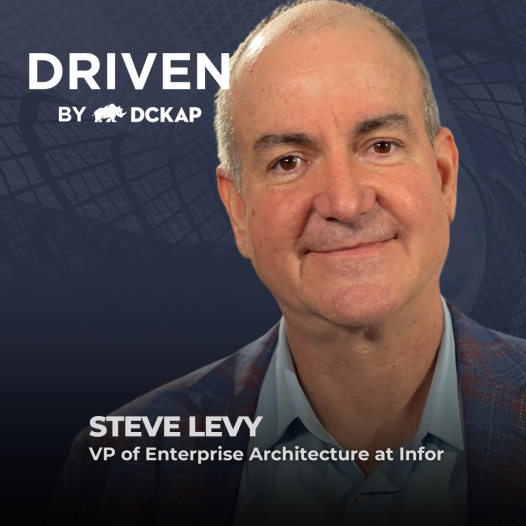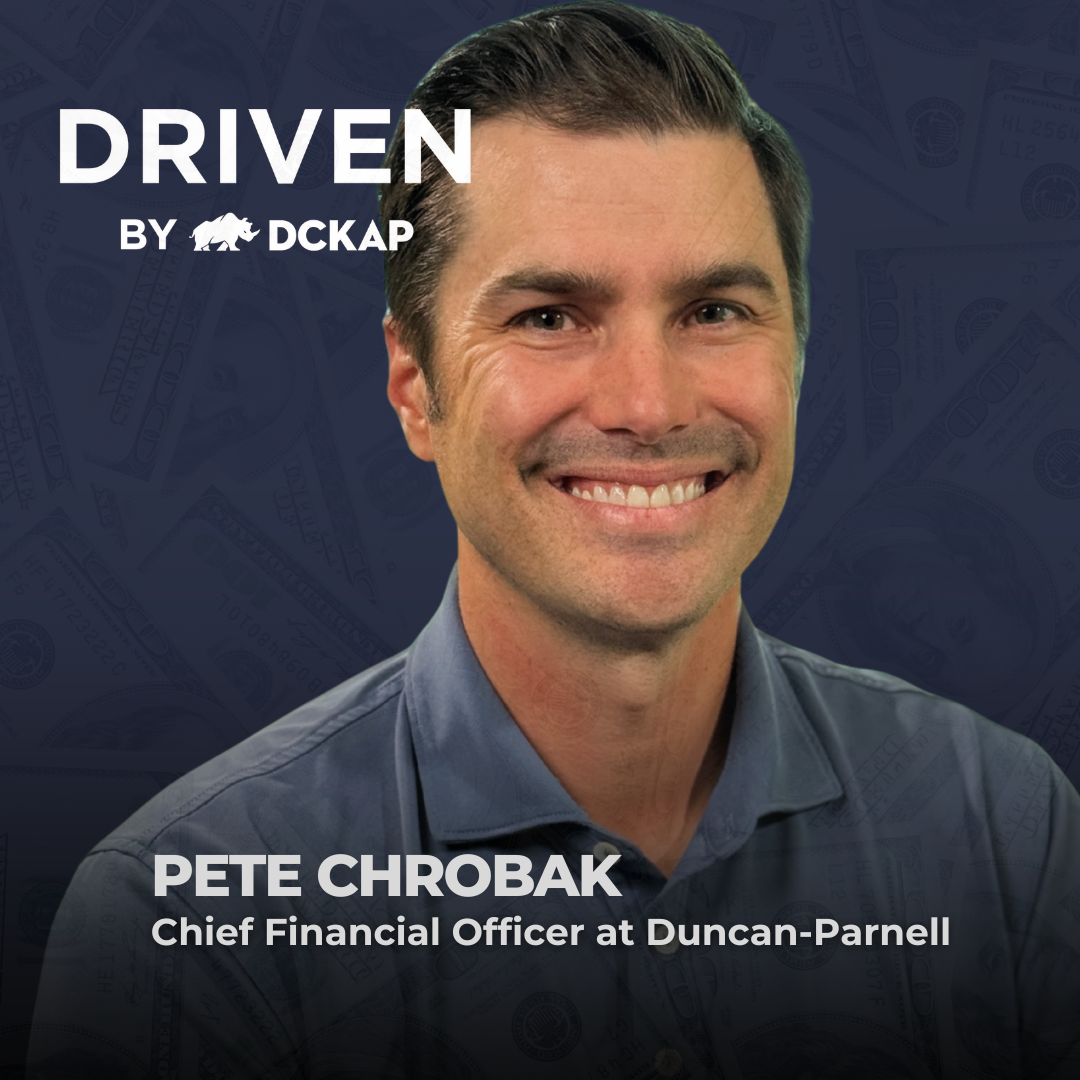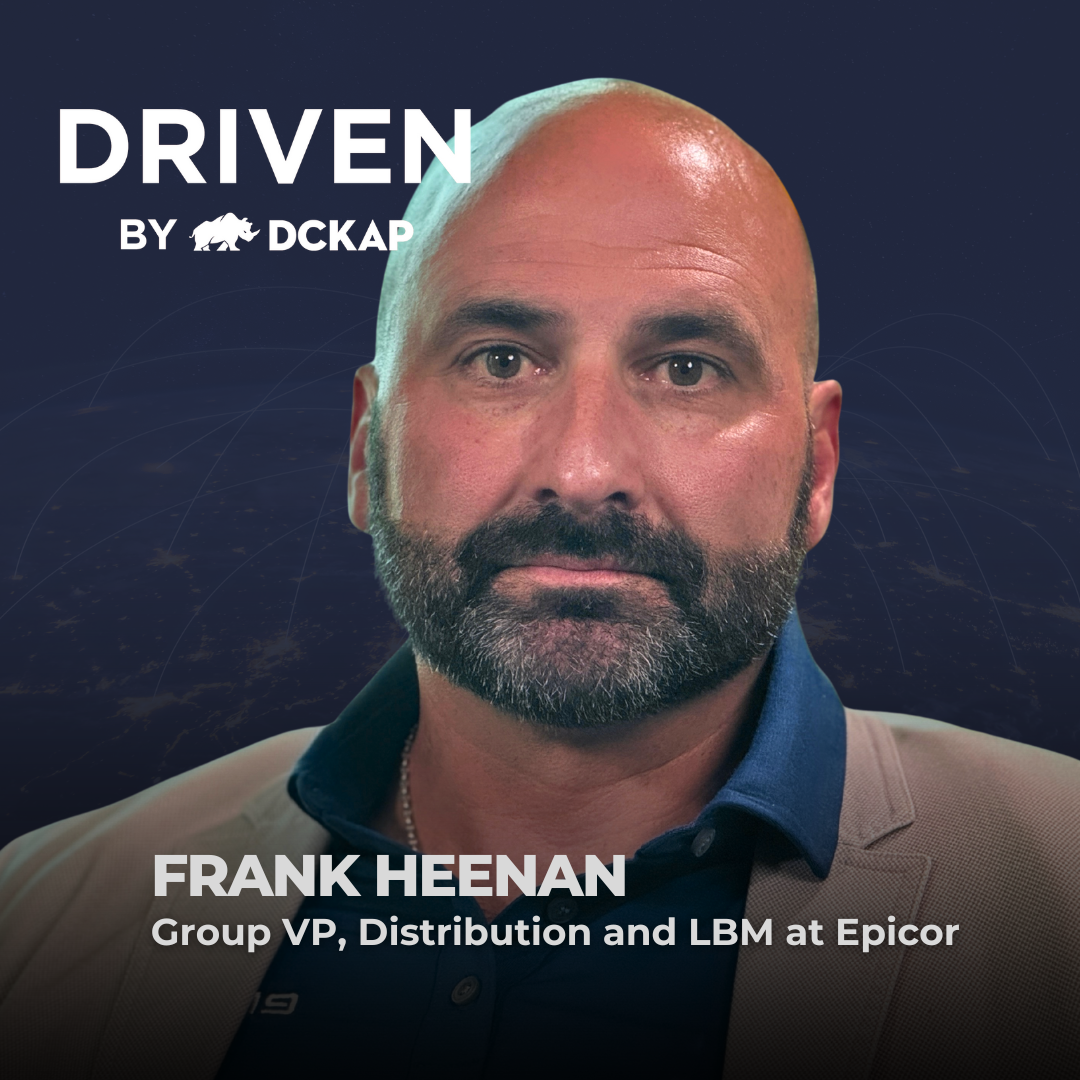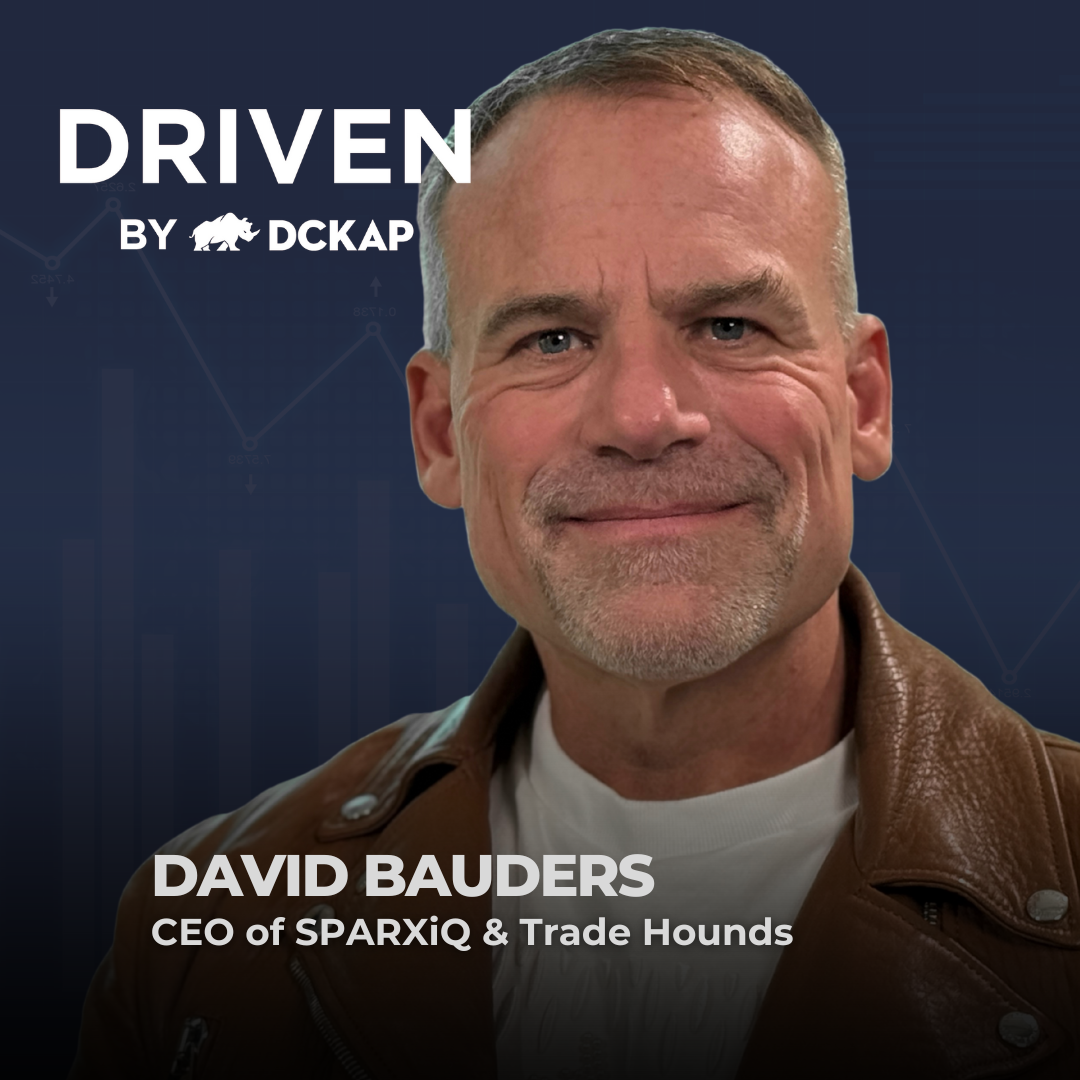Discover how businesses can accelerate growth in today’s dynamic marketplace and explore the secrets to success from a seasoned expert whose extensive experience in the industry provides invaluable insights. With a focus on best practices and strategies, this conversation offers a unique lens on navigating the complexities of modern enterprise architecture while working closely with leading distributors.
OR LISTEN ON:
Karthik Chidambaram: Welcome to a new episode of the Driven by DCKAP
podcast. Today we are joined by a very special guest, Steven Levy, Vice
President of Enterprise Architecture at Infor.
Steve Levy: Thanks for having me, Karthik. I'm so happy to be here. This is
one of my favorite podcasts, especially in distribution. You guys have all
of my favorite people on.
Karthik Chidambaram: Thank you so much, Steve. You know it's an absolute joy
and pleasure to talk to you, and thank you for joining us.
Before we get started, you are the Vice President of Enterprise
Architecture. What does that mean?
Steve Levy: It's a really fancy title, and I tell it to people so they don't
know what I do. So the problem is, if I spoil what I do on your podcast,
then everyone will know what it is. It is a really fancy title, but it's not
really that complicated. What we really do is we align systems to desired
outcomes.
So architecture is a very disciplined thought process to make sure that
we're aligning to goals. It's used often in governance and in system design.
Um, the most important tenant is don't start with the present state. Always
start with the end in mind. Start with where you want to be, not where you
are.
Karthik Chidambaram: Start with the end in mind. So Infor has many products
and how are you helping distributors and how are you solving problems for
distributors?
Steve Levy: What I'm supposed to do on our strategy team is talk to
distributors, find out what keeps them up and what they're excited about,
and based on that data, I make sure that our systems are able to satisfy
their needs in the next three to five years.
Again, that's what I'm supposed to do. Sadly, what we wind up doing in the
real world is solving complex problems of today. Because as distributors
come up with interesting problems, some of them don't even touch Infor
technology. But because I'm able to think in a way of three to four years
out and with goal alignment, they tend to use me to put out a lot of fires.
Karthik Chidambaram: I'm just trying to understand you. There are many ERPs
in the market. There are companies with Choose Epicor, there are companies
with Choose Info R. There are companies with Choose SAP. So what is your
ideal customer profile? Right? So when I mean, as a distributor, let's say
I'm gonna choose an ERP, I have quite a few choices.
When would I choose Infor, or where do you guys fit in?
Steve Levy: Well, you should choose Infor all the time. I mean, every
distributor should never choose an Epicor or an SAP, because Infor is best
for distributors. However, that's really not the reality we live in. When I
think of the, the example, the prototype of an infor customer, they're an
innovative distributor.
Really looking to differentiate themselves from the marketplace. Our
platform really does allow distributors to create innovation easily and
without a large team of developers. So it's sort of an innovate and build
your own differentiation sort of customer. But because we are industry
specific in the distribution market, our products are pre-wired.
So you don't need to innovate, you just need to differentiate. So I would
say that we're everywhere from a standard distributor to those that are
converged with manufacturers and innovating new lines of revenue. Everybody
in between.
Karthik Chidambaram: I sometimes think innovation is an overused word, so
how are you innovating or how are you differentiating?
Steve Levy: Internally, we really don't talk about innovation. It is very
much a word designed to drive something new, not to start with the end in
mind. So at least, you know, when I'm around in, in an architecture setting,
all of our sessions are focused on things we're trying to do. So we try to
use words like use case, right?
We try to say, you know, in technology we talk about use cases. Very
specifically as a distributor, I have a goal. I wish to ship my product and
sell it for more than I bought it for. So we look at those use cases and how
to really accomplish those in the most effective way possible. Lately we've
been trying to automate use cases completely.
What if we didn't need a person at all?
Karthik Chidambaram: And you decide on the product roadmap for distribution
and all that. Is that a part of your job as well?
Steve Levy: It is. I don't actually run the product roadmap. We have product
managers for all of our products, and they're all responsible for the actual
roadmaps. I influence the roadmaps.
I tell them the trends that are becoming popular that will be relevant for
distributors, tariffs, and being able to process tariffs. Sometimes
retroactively would be a great feature for us to have. Come 2025, and sure
enough, that feature will be probably used.
Karthik Chidambaram: I think you maintain a great relationship with
customers. You know, yesterday I was just seeing Katie, you know, she just
walked into you and said, Hey, thanks for helping me with another customer
who had some challenges running the product and all that, right? So the
customer relationships are very critical, so you get feedback from the
customer and then pass it on to the product team.
Steve Levy: Yes. Really, in order for me to get the data that I need from
customers, they have to trust me. Mm-hmm. I mean, it really, it's a trust
relationship. I'm asking them questions that are beyond the relationship of
a software vendor and a distributor. I'm asking for example, Katie, what
keeps her up at night?
What is she most afraid of and what is she most excited about? If the
distributors don't trust me that I'm using those answers for their own good,
uh, it doesn't do much good for me. So. I tend to earn that trust by helping
them with whatever they need. If they need me to help 'em out with a
physical inventory count one weekend, I'm in the warehouse counting boxes.
Karthik Chidambaram: In terms of challenges facing distributors today,
because you work with a lot of distributors, what do you think, you know, on
a technology perspective, what do you think are some of the challenges? Uh,
what are some of the gaps that you see?
Steve Levy: So. Distributors are faced with many challenges. It used to be
disintermediation.
We used to talk a lot as an industry about the number one fear was
disintermediation, which is our manufacturers trying to take our business.
Historically, the manufacturers have always envied distributors, profit
margins, and have desired to disintermediate them. I think today as
technology evolves and even with the advent of AI and hyper automation,
we're seeing new forms of competition.
Marketplaces. I mean, yes, we had Amazon, we had these massive marketplaces,
but now we're seeing little bespoke marketplaces pop up. They're driving our
costs down. In our innovative product, and I'm using the wrong word there,
but you know, we all have our core commodities and then we have some
ancillary prices.
They're not always impulse buys, but these ancillary products historically
have made up most of the margin for us, and I think these new competitors
are sniping at those, those ancillary items, the ride along where we're
really making our money. That's gonna create an interesting challenge. I
also think that with AI and automation, we're facing these new competitors
who are automating everything.
So as historical distributors where we have pickers pick our items and we
have salespeople actually sell them, we incur more costs than the people who
are automating try to take our profit margin because they can do it more
efficiently than a historical, traditional distributor.
Karthik Chidambaram: Yeah, we make systems talk to each other and automation
is something we work on extensively. What is Infor doing in the AI and
automation space? I'm just curious. So how are you solving challenges with
AI?
Steve Levy: We have some really exciting use cases in automation. Now we're
doing a lot with AP automation, so scanning in your inbound bills and your
inbound invoices, doing AI to do optical character recognition, to do the
three-way matching to actually go into our ERP, find the purchase order,
find the receiving note, match them all up, and if applicable, send them to
an accounts payable clerk with a confidence score that they're ready to pay.
If it's a perfect match, we can automatically pay it, or if there's a
discrepancy, we can make sure that the right team gets that discrepancy. So
we're finding that accounts payable automation is pretty popular these days,
which is surprising to you and I because that's the oldest. I mean, we've
been doing OCR for a long time with this promise, so it seems strange to me
that the oldest use case is also the newest.
I'm really excited personally by the work we're doing with Gen AI to split
up, uh, documents and intentions. We're finding that the word gen AI makes
it sound like it only generates. But it's really great at predictive
analytics. Which involves, you know, if somebody sends you an email and it
has three different desires or intentions in there, maybe a new order, a
pricing discrepancy and a billing dispute, or a special order inquiry.
Gen AI can take that, slice it up into three tickets and put it into your
ticketing system, whether it's in fours or ServiceNow. We're finding that
that's a really innovative use and it really helps distributors out because
we have a hard time dealing with multiple requests in one ask. We tend to
forward it around to accounts payable, and then we forward it around to the
purchasing department to get the special order, and then we forward it
around to the shipping department to find out when the order is going.
Only two of those things get answered. Or we have eight meetings and we
answer 'em after his delivery. Got there. Those are bad things, so I'm
really excited that we're solving some of those problems.
Karthik Chidambaram: And do you see a lot of distributors adopting that in
terms of they're practically using that in the business, and are they also
seeing big changes or maybe not even big changes, you know, are they seeing
wins because of their leveraging?
The gen AI stuff you talked about.
Steve Levy: I'm not seeing many people using in the real world the task
splitting up. I, I don't think that people are at the point where they
really want to trust AI with, with commerce or gen ai, with commerce, I
mean, machine learning AI has been running commerce and purchasing for,
since I had hair, so we've always used artificial intelligence in compute,
but it's this new gen ai, people don't trust it with their commerce yet.
Mm-hmm. As it turns out, I mean, from my impression, it's as accurate as an
employee. Our average employees are not really that accurate. Our
exceptional employees are great. It's, it's not exceptional yet. It's an
average employee, but what we use today are the dumbest models we'll use for
the rest of our lives.
Karthik Chidambaram: Yeah. Another thing possibly I think we could do is,
you know, you just create the draft, you know, create the draft ticket, you
know, keep the drafts ready, and then you have a human look at it. So it
does save time that way. Right. Okay. I have the draft. Okay. It looks good.
Or maybe I’ll make some edits. Just like an email, right?
So I asked ChatGPT to write an email for me. I don't copy paste the whole
thing and just send it. Right. You know, I edit it. Right?
Steve Levy: Absolutely.,
Karthik Chidambaram: So yeah, I think, you know, that could be a great use
case as well.
Steve Levy: Yeah. And the one, there's a use case in distribution that we
are seeing that really is creating the most value for distributors, and that
is really natural language searching.
At scale using AI to take in 10,000 items and match them up to the most
likely candidate. Um, so we find a lot of distributors spend time searching
for items in customer service, in sales, in support. We're constantly
searching for the right item. What does Steve mean when he says screw? Is it
a three quarter inch nickel, like.
You don't know, but Steve says, screw. So we're really finding systems that
are doing that matching are really saving a ton of time for distributors. So
at Andre, I think we saved 7,200 hours with just that one use case, which is
an amazing amount of time. Andre is a really innovative distributor.
Most of us love to save money. So if we save three man hours or three man
years of work, we do our business with three less men. Um, what Michael
Knight over at Andrees did is he felt that that time would be better
utilized. He really trusted that his people have the right vision and that
they're aligned in bettering the company.
So as a result, the salespeople used this time for strategic sourcing. I.
Since they're not searching for items and matching it up, they're calling
their manufacturers and saying, Hey, can you give me an extra 10% on this
one for this bid? And what they're actually doing is increasing the net
profit for the end reason.
And that's really exciting for me. And I'm finding that distributors are
saving a ton of time. Those efforts are really moving the needle and it's a
real problem that we're solving. That's the one that's got me most excited.
I think we're saving man years quickly.
Karthik Chidambaram: Business is all about relationships and you do a great
job at that, I think.
Steve Levy: Thank you.
Karthik Chidambaram: See you at a lot of conferences and even in the
example we talked about, right? So Katie at For Supply had a problem. She
reached out to you and then you helped another customer. Right? So how do
you build these relationships and what tips and advice would you like to
share our audience?
Steve Levy: I guess, I mean, I'm always honest. I'm just not smart enough to
lie, so I make sure that if something is not good in our ERP, and as a
little note, there are things in every ERP that are not good. If you think
about your career at work, every problem you've probably had was in your
ERP, so they can't be perfect.
Right. SAP invented ERP, I blame them for all the problems that happened
afterwards. It's difficult for me to know that I do a good job with
relationships. I'm constantly getting yelled at, and I'm constantly telling
people things that I probably shouldn't. Like, oh yeah, we really need to
fix that.
So I guess if I had to give one piece of advice, it's, be honest, be a
person of integrity. People respect that. I mean, it's easy to share
good news. It's really difficult to share hard news, but I find it. That's
where you really find honesty is those people that are willing to, to give
you bad news as well.
When Katie and I have not always had great conversations, I mean, I'm always
willing to help, but there are times when, you know, I've had to deliver bad
news to her, and I think that I- You go through those rocky times and
ultimately she respects that at least it's upfront and honest instead of me
lying for six months.
Karthik Chidambaram: Yeah, to be honest is great advice. But I also think
when you are customer facing, there's a lot you learn and you're able to
pass that on to the team. Like for instance, a lot of it not even be your
problem, right? So some screen doesn't work, you don't really do anything
there, you're just getting yelled at.
But then the key thing is to take that, take it to the product team. Hey,
this is what this customer's saying and we need to fix it. Let's fix it. And
then you take it back. And if one customer's having this problem, there's a
likely chance that five of the customers are also having, so you're really
preventing the problem.
Steve Levy: Yes, absolutely. I think that one, I'm, I'm calm under pressure.
When the sky is falling and there's fire and brimstone everywhere,
everyone's like, oh my God, what are we gonna do? And I'm like, Hey, it
feels like home. I'm looking for mom and dad. I'm trying. So it's easy for
me to take. The line of fire and to be able to translate that emotional
response, which sometimes is warranted, take that emotional response,
translate it into technical requirements, and deliver it to the people that
can actually fix the problem in a timely fashion, and then go back to the
original person and say, okay, we've communicated this and we hope to
deliver it by this date.
Again, along the lines of honesty, I think people genuinely appreciate that,
that level of candor, but it's not easy. For most, for me, it's just the way
I am. Right. I've always been that way.
Karthik Chidambaram: Technology is ever evolving, right? So there's new
things every day.
And you have been in this business for a while, you know, you are in tech,
and one thing in tech is if you don't upskill yourself, you're gone. How do
you upskill?
Steve Levy: I am a voracious reader. I read incessantly. If I'm driving or
on an aircraft, I'm usually listening to some type of podcast or reading an
article about distribution or technology. When people ask, what's my hobby,
it feels like it is work because all I do is I read about our industry,
right?
I love the history of distribution. I love the people in distribution. We're
a gritty group of people that just get stuff done, and I love that. Right?
But as we mentioned about architecture, start with the end in mind. We need
to deliver the right product to the right customer at the right time.
Distribution is the embodiment of that. Start with the end in mind. It
really is. Get the product down the supply chain to our customers.
Karthik Chidambaram: I strongly believe readers are leaders. I would like to
end with this question, Steve. Sure. What book are you reading right now? Or
is there any podcast you are listening to that you would like to share with
our audience?
Steve Levy: I am not reading a book. I just finished The Odyssey. Um, I. It
is boring. I don't recommend it, but it was a great translation of the
Odyssey. It was written by a woman and it was really in the poetic sense. So
it was a great one podcast that I listened to. I am a Freakonomics junkie. I
listened incessantly to Freakonomics.I read the book when I was younger, and
ever since then, I think I've heard all 600 episodes.
Karthik Chidambaram: Thank you so much, Steve, for joining this conversation
and great chatting with you.
Steve Levy: It was my pleasure, sir.
Sign up to receive email updates
Enter your name and email address below and I'll send you periodic updates about the podcast.




